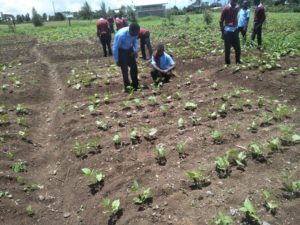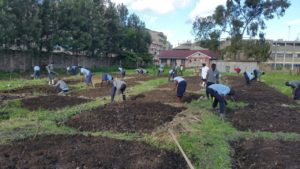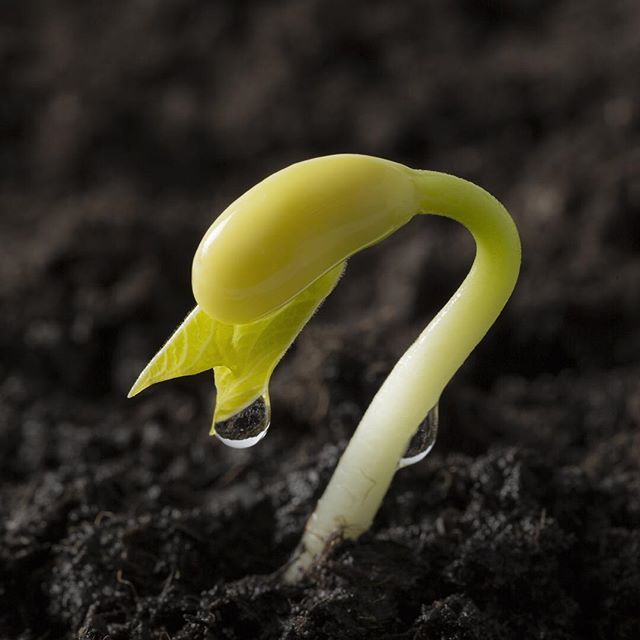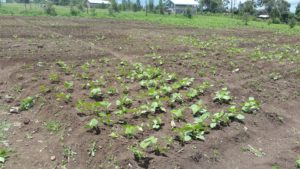On a Thursday afternoon, a group of 38 students of Mwireri Secondary School, Mweiga Nyeri are busy in school farm with their agriculture and head teacher, Mr. George Murage, inspecting the individual students bean plots. These are form four students monitoring the germination of the bean seed planted a week ago. This is not just a normal agriculture lesson, it is part of the agriculture subject practical examinations for the Kenya Certificate for Secondary Education (KCSE). In 2018, the Kenya National Examination Council (KNEC) selected beans as the test crop for all agriculture students across the country. Students are required to set up the bean demonstrations and tender their crop all the way to maturity while documenting the management practices applied to the plots.
On this afternoon, the students have been visited by Dr. Boaz Waswa, a senior Soil Fertility Specialist from the International Center for Tropical Agriculture (CIAT). CIAT is a global center for beans. In Africa, bean work is implemented under the Pan Africa Bean Research Alliance (PABRA), a partnership of bean stakeholders across 30 countries.
“Whereas for the students this is part of the examination, at CIAT we see this as a great opportunity to reach out and support the schools and guide the students through the bean production cycle,” said Dr. Waswa. The student demonstrations across the country present nation-wide experimental sites that can be used to monitor and assess the performance of certified bean varieties across diverse agro ecological zones. The demonstrations can also be used as learning sites for scaling out best bean production technologies to neighboring farming communities, as is the case for Mwireri, presented here.

Agriculture students at Mwirerir Secondary School, Mweiga Nyeri inspecting their bean demonstration plots
The collaboration between CIAT and Mwireri Secondary School dates back to 2017 when the school expressed interest in improved bean production. The need to increase bean production arose from the desire of the school to be self-sufficient in bean production from its own farm. The school, which implements a lunch program for its over 200 students and teachers saw the need to produce food to be used for the lunch program thereby reducing costs otherwise incurred purchasing the beans from far off markets. This need led to CIAT establishing a jointly managed bean demonstration on the school farm. The initial effort involved establishing a demonstration to evaluate the suitability and performance of two certified bean varieties: Mwitemania (GLP 92) from Kenya Seed and KATX56 (locally referred to as Gituru) from Kenya Agriculture and Livestock Research Organization (KALRO) Katumani, Machakos. Despite the harsh weather conditions during that short rain season of 2017, the beans performed well yielding 20kg for every kilogram of seed planted. This motivated the school to expand the area under bean production during the 2018 long rains season to one and a half acres.
It was therefore a pleasant coincidence when the KNEC selected beans as the test crop for the 2018 examination class. The school, with the experience already gained in bean production during the 2017 season and the partnership with CIAT, was ready to guide the students through this learning. The school selected KATX56 a red kidney bean for the student demonstrations. CIAT facilitated access to this variety from KALRO Katumani. CIAT experts recommended use of SeedPlus- a seed dressing product from Amiran Kenya for protection of seed from early development diseases and damaging insects. In addition, CIAT provided simple printed guides for bean production. The students, with guidance from their teachers, established the demonstrations on 13 March 2018, applying manure and inorganic fertilizer- Diammonium Phosphate (DAP) and planted the dressed seed. Upon germination, the students noted a high incidence of crickets that were damaging the beans. After consultation with experts, it was recommended to use Cyclone an insecticide from Osho Chemicals to control the crickets. This was very effective and saved the plants from further destruction. However, the students were required to do gapping to restore the damaged plants.
On this day, the students, their teachers and the CIAT expert took time to assess the performance of the beans. The CIAT expert took time to explain to the students the importance of beans for nutrition and income. Beans are an important and major source of protein and micronutrients, especially iron and zinc. Their consumption contributes to improved nutrition. The discussions went deep on best practices for bean production including proper selection and use of certified seed, seed dressing to protect from pest and diseases, early land preparation, use of inorganic fertilizer – especially DAP – during planting to improve root formation, organic manure use to improve soil structure and moisture retention, timely weeding, pest and disease management. Other topics covered included beans as an enterprise to earn income. The students are expected to apply the knowledge received to tender their plots to maturity. They will be expected to document observations on bean growth, management practices applied, pest and diseases, and any other challenges as part of their learning and examination. During the tour of the demonstrations, each student received attentions and got an opportunity to ask specific questions on the observed crop performance.
Beyond Mwireri Secondary School, CIAT researchers are reaching out to several other schools in the country to provide the needed technical support as the scientists assess the performance of the certified beans across diverse environments. This support will be given to the schools throughout the bean cropping season.

Agriculture students at Ruaraka Secondary School, Nairobi establishing bean demonstrations under supervision of their agriculture teacher
According to Dr. Waswa, the country needs innovative farmers to feed itself. Equipping the youth with skills in modern farming is important in raising a new generation of agriculturalists who will not only produce enough to feed the families but surplus to sell and make money. Agriculture can be harnessed to create the much-needed employment opportunities for the millions of unemployed youth.
Read more on how Mwireri Secondary School influenced farmers in Mwireri, Nyeri to grow beans here.


